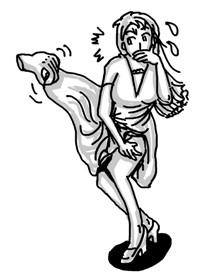
 |
| Illustration: Lu Ting/GT |
Schools nationwide officially began the summer holiday on July 1. Recent news of deadly accidents involving children drowning or falling from high-rises has been drawing public attention. The public is urging the country to introduce new regulations to better protect children and punish parents who neglect their children and leave them unattended. Now we can only hope that alarmed by the tragedies, no more similar cases happen again before a comprehensive legal system is established.
Also making headlines this week are cases of public molesting and sexual harassment.
This Tuesday, Shanghai's metro police announced that they had arrested 13 people this year suspected of molesting female passengers.
The latest case was reported on Tuesday. A woman riding an escalator in a subway station in Pudong New Area realized that her skirt was being lifted up by a man behind who was using a mobile phone to take a video. The angry but brave woman shouted for help and chased the man in the station. With the help of bystanders, the man was caught and police later found that there were dozens of similar video clips on his mobile phone, meaning he had succeeded in filming dozens of unsuspecting women before he was apprehended. The man is now in administrative detention.
The incident was similar to another case earlier in June that occurred on a metro train.
A video circulated widely online showed a man who slid his left hand under his right arm to touch the breast of the woman sitting beside him. The woman squirmed in her seat with her eyes closed, but dared not confront the man or protest.
The video was filmed and posted online by a passenger in the same compartment who noticed the incident. Local police confirmed the authenticity of the video and urged the woman to contact them.
According to local police, the woman eventually did get in touch to give further details. The 36-year-old man later turned himself in to police and was put in detention.
Some of my foreign colleagues were surprised by the victim's passive reaction. She could have stood up and left the seat, or shouted for help. Had it not been for a public appeal after the video was posted online, she would probably not have reported the incident to police.
The answer may well lie in Chinese culture, which has traditionally relegated women to an inferior status.
Traditional doctrines still prevail in many Chinese people's thinking. There is a Chinese saying, "Flies bite cracked eggs." However, people forget that it is the flies that are the pest, and instead target the eggs.
Some women who are harassed think first about how she will be perceived if she speaks out, rather than how to protect herself. She may have internalized the misogynistic assumption that women who are targeted by molesters invited the behavior. Social mores have led victims to feel guilty. Their concerns are not irrational.
In the countryside, when a woman is molested or raped, the initial wave of sympathy for the victim is often swiftly replaced by gossip and slander. The situation in cities may be better than it is in rural areas, but old habits die hard.
Last month, a colleague posted a notice on our intranet that a man flashed her near our office building. She responded by running away and later warned other female colleagues to be cautious. Several colleagues replied that they had encountered similar experiences. We concluded that the more shocked the victim is, the more excited the man will be. Just ignoring him may be the best solution. Regretfully, no one thought of reporting the incident to police so that he could be legally punished.
This brings me back to the passenger on the metro who filmed the man assaulting the woman, thereby collecting solid evidence which later helped the police to identify the culprit. His act likely helped to prevent many more women from becoming potential victims.
Some people wondered why he filmed the incident rather than immediately confronting the molester. That way, the man would have been nabbed on the spot, saving police the time and effort needed to track down the suspect.
However, I have to say this opinion is too idealistic. With so many reported cases of good Samaritans endangering their own safety, warmhearted people have to act cautiously. Moreover, without photographic evidence to implicate the culprit, he may well have escaped prosecution and punishment.
Our society needs more people like the video-taper to maintain social order. In fact, we have professional photojournalists in our office. Why hadn't we thought of sending a male colleague to track the flasher and collect evidence that could help police prosecute him? Everybody can play a role in helping to maintain order in society.
Victims should also be encouraged to protect themselves. If they dare not protest on the spot because of safety or social stigma, they should actively cooperate with police to prevent similar cases from happening again. Later is better than never. People shouldn't simply use the cases as fodder for tea-break gossip. We must regard the victims as family members and take action to fight for their safety and empowerment.
















 Seasonal migration of Chinese left-behind children
Seasonal migration of Chinese left-behind children


![]()
